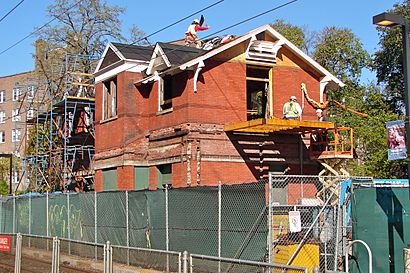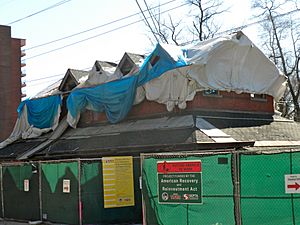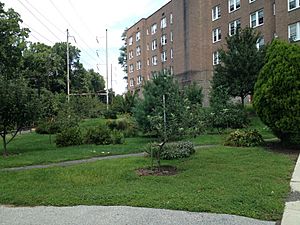Tulpehocken station facts for kids
Quick facts for kids
|
|||||||||||||
|---|---|---|---|---|---|---|---|---|---|---|---|---|---|

The station at Tulpehocken in 2010, during restoration
|
|||||||||||||
| Location | 333 West Tulpehocken Street Germantown, Philadelphia, Pennsylvania |
||||||||||||
| Coordinates | 40°2′6.36″N 75°11′12.48″W / 40.0351000°N 75.1868000°W | ||||||||||||
| Owned by | SEPTA | ||||||||||||
| Platforms | 2 side platforms | ||||||||||||
| Tracks | 2 | ||||||||||||
| Connections | |||||||||||||
| Construction | |||||||||||||
| Parking | 35 | ||||||||||||
| Disabled access | No | ||||||||||||
| Other information | |||||||||||||
| Fare zone | 2 | ||||||||||||
| History | |||||||||||||
| Opened | 1878 | ||||||||||||
| Electrified | 1918 | ||||||||||||
| Previous names | Walnut Lane | ||||||||||||
| Services | |||||||||||||
|
|||||||||||||
|
|||||||||||||
|
Tulpehocken Station Historic District
|
|||||||||||||
|
U.S. Historic district
Contributing property |
|||||||||||||
| Location | Germantown, Philadelphia Pennsylvania, USA |
||||||||||||
| Built | 1878 | ||||||||||||
| Architectural style | Late Victorian | ||||||||||||
| NRHP reference No. | 85003564 | ||||||||||||
| Added to NRHP | November 26, 1985 | ||||||||||||
The Tulpehocken station is a train station in Philadelphia, Pennsylvania. It's part of the SEPTA Regional Rail system. You can find it at 333 West Tulpehocken Street in the Germantown neighborhood. This station serves the Chestnut Hill West Line. The `Pennsylvania Railroad` built the station way back in 1878. It's in Zone 2 on the Chestnut Hill West Line.
Contents
History of Tulpehocken Station
Many people used to think that the famous architect `Frank Furness` designed this station. However, the real architects for all the stations on the Chestnut Hill West line were `William Brown` and `William Bleddyn Powell`. They worked for the `Pennsylvania Railroad` at that time. All the stations on this line are now listed on the `Philadelphia Register of Historic Places`. Tulpehocken Station is also a special part of the `Tulpehocken Station Historic District`. This district is listed on the `National Register of Historic Places`.
The station building used to have a ticket office or a business on the first floor. A home was located on the floor above it until 1978. After that, the building was closed, but trains still stopped there. `SEPTA`, the company that runs the trains, didn't do much to take care of the building. Because of this, it started to fall apart.
Saving the Station Building
In November 2007, a local group called the `West Central Germantown Neighbors` (WCGN) started a committee. They called it "Save Tulpehocken Station." Their goal was to fix up the station and find a new use for it. They worked with `SEPTA`, the `Philadelphia City Planning` department, and local politicians. The community raised money to get a special grant from the `National Trust for Historic Preservation`. This grant helped them hire a project manager. The manager checked the building's condition and looked for ideas for new businesses to use the space.
In the spring of 2009, `SEPTA` received money from a federal economic stimulus program. This money was used for repairs on the Chestnut Hill West line buildings. As a result, the Tulpehocken station building got much-needed repairs. The goal was to make it attractive for a business to move in.
The rebuilding of the station included removing all the old, rotten wood. New wood was put in to support the canopy, which is like a roof over the platform. Ceramic tiles were also added around the windows. The long "porch" area was kept and made stronger. This way, it could be used by people or businesses. Once the outside was finished, it looked just like the original building. Inside, there are two open floors with plywood floors. A chimney is in the middle of the building. `SEPTA` uses some of the space for storage and for its communication system. Old windows and doors are stored in the basement. Fans on the second floor help keep the air fresh and prevent mold.
Even in 2018, the building was still empty. However, in May and June 2018, `SEPTA` added new water, gas, and sewer lines to the building. This was done to make it easier to rent the space to a business. People have tried to get money to replace the windows, but so far, they haven't been successful.
The Orchard and Garden Project
After the building repairs were done in 2011, the `West Central Germantown Neighbors` (WCGN) had another idea. They asked `SEPTA` if they could clean up an overgrown and trash-filled area next to the station. WCGN suggested creating an orchard and garden there. They planned to work with the `Philadelphia Orchard Project`. `SEPTA` approved the idea. WCGN spent a year designing the layout. They planned to plant fruit trees, native trees, berries, and shrubs. The idea was for people to walk around and pick the fruit.
`SEPTA` helped by providing machines and workers to remove dead trees and large items that had been dumped there. WCGN filled dumpsters that `SEPTA` provided. Once the area was clear, WCGN tilled the soil and planted grass. By 2014, trees from the `Philadelphia Orchard Project` were planted. Several workdays also involved planting bushes and berries.
The orchard now has peaches, pears, plums, and apples. It even has a special type of apple called the Tulpehocken apple. Blackberries, service berries, raspberries, and blueberries also grow there. In 2017, a pollinator garden was planted to help bees and other insects. `SEPTA` mows the grass around the trees and garden patches. WCGN takes care of the plants, adds mulch, and prunes the fruit trees.
Station Layout
The station has two platforms, one for trains going toward `Chestnut Hill West` and one for trains going toward `Temple University`.
| P Platform level |
Side platform, doors will open on the right | |
| Outbound | ← Chestnut Hill West Line toward Chestnut Hill West (Upsal) | |
| Inbound | Chestnut Hill West Line toward Temple University (Chelten Avenue) → | |
| Side platform, doors will open on the right | ||
| Street level | Exit/entrance and parking | |
Images for kids
 | Lonnie Johnson |
 | Granville Woods |
 | Lewis Howard Latimer |
 | James West |










